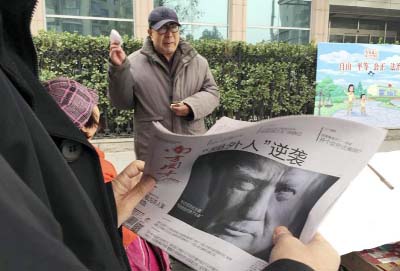
AP, Beijing :
People in Beijing expressed doubts Saturday about President Donald Trump’s ability to steer the U.S. economy and manage China-American relations, underscoring concerns over trade, Taiwan and other issues.
While Trump didn’t mention China in his inaugural address Friday, he referred often to the country during the campaign and upended diplomatic protocol after the election by speaking on the phone with the president of self-governing Taiwan, the island China considers its own territory.
Aaron Wang, who works for a logistics company, said he hoped for the best but was wary of Trump’s threat to disrupt commerce between the countries, including imposing a 45 percent tariff on Chinese imports.
“I will wait and see what Trump actually does in the future, but I do hope that the China-U.S. relations can develop in a good direction under Trump’s presidency,” said Wang.
A retired teacher, who would only give her surname, Wei, said Trump hadn’t yet shown that he could handle the U.S. presidency.
“It’s really uncertain whether he can properly run the U.S.,” Wei said. “A business person can run a country very well, but he can also do a very bad job.”
On a visit to Beijing, Dunkin’ Brands CEO Nigel Davis said he wanted to reinforce the importance of global free trade to Trump, who opposes the 12-nation Trans-Pacific Partnership and has suggested he might renegotiate the 1994 North American Free Trade Agreement.
“I will give him concrete examples and talk to him about how you can overcome obstacles,” Davis told The Associated Press.
China is the world’s second-largest economy behind the U.S., and Trump railed during his campaign against alleged Chinese cheating at trade and manipulation of its currency. Those assertions came despite evidence that for the past couple of years, China has been intervening in markets to prop up its currency, not push it lower in a manner that would benefit exporters to the detriment of U.S. businesses.
China’s economy slowed over the past year and exports fell back into contraction last month, signaling renewed weakness as it faces possible trade tensions under Trump. However, China still sells considerably more to the United States than it buys, resulting in a trade deficit in goods amounted to $289 billion through the first 10 months of 2016.
In a commentary on Trump’s inaugural address, the official Global Times newspaper said he had made a number of “lofty promises” but offered few details on how he intended to carry them out.
People in Beijing expressed doubts Saturday about President Donald Trump’s ability to steer the U.S. economy and manage China-American relations, underscoring concerns over trade, Taiwan and other issues.
While Trump didn’t mention China in his inaugural address Friday, he referred often to the country during the campaign and upended diplomatic protocol after the election by speaking on the phone with the president of self-governing Taiwan, the island China considers its own territory.
Aaron Wang, who works for a logistics company, said he hoped for the best but was wary of Trump’s threat to disrupt commerce between the countries, including imposing a 45 percent tariff on Chinese imports.
“I will wait and see what Trump actually does in the future, but I do hope that the China-U.S. relations can develop in a good direction under Trump’s presidency,” said Wang.
A retired teacher, who would only give her surname, Wei, said Trump hadn’t yet shown that he could handle the U.S. presidency.
“It’s really uncertain whether he can properly run the U.S.,” Wei said. “A business person can run a country very well, but he can also do a very bad job.”
On a visit to Beijing, Dunkin’ Brands CEO Nigel Davis said he wanted to reinforce the importance of global free trade to Trump, who opposes the 12-nation Trans-Pacific Partnership and has suggested he might renegotiate the 1994 North American Free Trade Agreement.
“I will give him concrete examples and talk to him about how you can overcome obstacles,” Davis told The Associated Press.
China is the world’s second-largest economy behind the U.S., and Trump railed during his campaign against alleged Chinese cheating at trade and manipulation of its currency. Those assertions came despite evidence that for the past couple of years, China has been intervening in markets to prop up its currency, not push it lower in a manner that would benefit exporters to the detriment of U.S. businesses.
China’s economy slowed over the past year and exports fell back into contraction last month, signaling renewed weakness as it faces possible trade tensions under Trump. However, China still sells considerably more to the United States than it buys, resulting in a trade deficit in goods amounted to $289 billion through the first 10 months of 2016.
In a commentary on Trump’s inaugural address, the official Global Times newspaper said he had made a number of “lofty promises” but offered few details on how he intended to carry them out.

